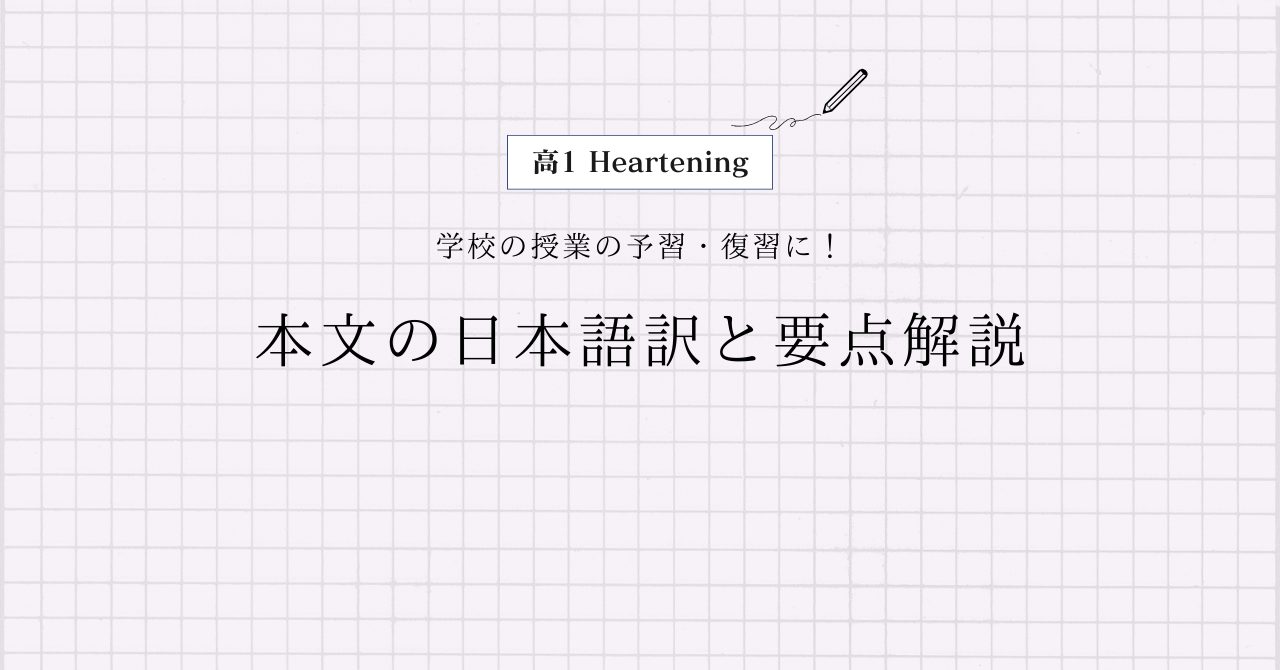桐原書店 高1Heartening Lesson8 Section4の本文の日本語訳と重要箇所の解説です。
Lesson8-1, 8-2, 8-3の解説はこちらからご覧ください。
>高1Heartening Lesson8 Section1 本文和訳
>高1Heartening Lesson8 Section2 本文和訳
>高1Heartening Lesson8 Section3 本文和訳
- Heartening Lesson8 Section4 本文と日本語訳
- Heartening Lesson8 Section4 重要事項の解説
- Today, long-cherished local festivals in Japan are in danger of disappearing forever.
- Many Japanese cultural traditions have been designated Intangible Folk Cultural Properties by local governments.
- According to a 2016 survey, unfortunately, sixty of these in twenty prefectures no longer exist.
- The namahage traditions are also facing challenges.
- Due to the shrinking population, fewer and fewer communities still maintain them.
- Originally, these celebrations were intended only for members of each community.
- However, one village has called on people outside the community to play the part of namahage since 2012.
- Such measures have been criticized by people in surrounding areas.
- They think that outsiders should not be allowed to take part in a private and sacred tradition.
- Even so, one local man says, “This tradition was handed down by our ancestors, so keeping it alive is more important than anything else.”
- There may be other options to save the precious heritage of these local communities.
- Should we try to keep such traditions alive in another form?
- Or, should we just accept that some will disappear over time?
- What do you think?
- Heartening Lesson8 Section4 まとめ
Heartening Lesson8 Section4 本文と日本語訳
Today, long-cherished local festivals in Japan are in danger of disappearing forever.
「今日では、日本における長年の地元の祭りが永遠に無くなる危機にあります。」
Many Japanese cultural traditions have been designated Intangible Folk Cultural Properties by local governments.
「多くの日本の文化的伝統は、地方自治体によって重要無形民俗文化財に指定されています。」
According to a 2016 survey, unfortunately, sixty of these in twenty prefectures no longer exist.
「2016年の調査によると、残念ながら、20県でこれらのうちの60個がもう存在していません。」
The namahage traditions are also facing challenges.
「なまはげの伝統も課題に直面しています。」
Due to the shrinking population, fewer and fewer communities still maintain them.
「人口の減少によって、今もその伝統を維持している地域は減りつつあります。」
Originally, these celebrations were intended only for members of each community.
「元々、こういったお祝いは各地域の人々のためだけのものでした。」
However, one village has called on people outside the community to play the part of namahage since 2012.
「しかしある村が、2012年からなまはげの役を演じてもらうために、地域外の人々に呼びかけています。」
Such measures have been criticized by people in surrounding areas.
「そのような施策は周辺地域の人々から批判されています。」
They think that outsiders should not be allowed to take part in a private and sacred tradition.
「彼らは、外部の人は地域内の神聖な伝統に参加するのを許すべきではないと考えています。」
Even so, one local man says, “This tradition was handed down by our ancestors, so keeping it alive is more important than anything else.”
「そうとはいっても、ある地元の男性は『この伝統は私たちの先祖から受け継がれてきたので、それを存続させることが他の何よりも重要です。』と言います。」
There may be other options to save the precious heritage of these local communities.
「こういった地域社会の貴重な伝統を守るための選択肢は他にもあるかもしれません。」
Should we try to keep such traditions alive in another form?
「私たちはそのような伝統を別の形で存続させるようにするべきでしょうか?」
Or, should we just accept that some will disappear over time?
「または、いくつかは時間とともに消えていくことをただ受け入れるべきなのでしょうか?」
What do you think?
「あなたはどう思いますか?」

Heartening Lesson8 Section4 重要事項の解説
Today, long-cherished local festivals in Japan are in danger of disappearing forever.
“long-cherished”は「長年の、念願の」、“local”は「地元の、現地の」という形容詞です。
“be in danger of~”は「~の危機にある」という重要表現になります。
“disappear”は「無くなる、消える」という動詞で、ここでは前置詞“of”の後ろなので「動名詞」になっていますね。
“forever”は「永遠に、ずっと」という副詞です。
Many Japanese cultural traditions have been designated Intangible Folk Cultural Properties by local governments.
“cultural”は「文化的な、文化の」という形容詞で、“tradition”は「伝統」という名詞です。
“designate”は「を指定する」という動詞で、“be designated A by B”で「BによってAに指定される」となります。ここでは「現在完了」と「受動態」が組み合わさっていますね。
“Intangible Folk Cultural Property”は「重要無形民俗文化財」で、“government”は「政府」、“local government”で「地方自治体」という名詞になります。
According to a 2016 survey, unfortunately, sixty of these in twenty prefectures no longer exist.
“according to~”は「~によると」という重要表現ですね。
“survey”は「調査」という名詞で、“unfortunately”は「残念ながら、不運にも」といった副詞になります。
“of”は前置詞で,”A of B”の形で「BのA」というように後ろから前に訳します。
“these”は“this”の複数形で,「これらは(の)」といった意味になります。
“prefecture”は「県」という名詞で、“exist”は「存在する」という動詞です。
“no longer~”は「もはや(もう)~ではない」という重要表現ですよ。
The namahage traditions are also facing challenges.
“also”は「また,さらに」といった副詞で,付け加える役割があります。色々な文で使うので必ず覚えましょう!
“face”は「に直面する」という動詞で、“challenge”は「課題、困難」といった名詞になります。ここでは「現在進行形」になっていますね。
Due to the shrinking population, fewer and fewer communities still maintain them.
“due to~”は「~によって」という重要表現ですね。
“shrink”は「縮む、小さくなる」という動詞、“population”は「人口」という名詞で、“shrinking population”は「人口減少」という名詞になります。
“比較級 and 比較級”は「ますます~」といった重要表現で、“few”は「少ない」という形容詞です。
“community”は「地域」という名詞で、“still”は「まだ、今も」といった副詞、“maintain”は「を維持する」という動詞になります。“them”は“The namahage traditions”を指していますね。
Originally, these celebrations were intended only for members of each community.
“originally”は「最初は、元々は」という副詞です。
“celebration”は「お祝い」という名詞で、“intend”は「を意図する、を目的とする」といった動詞になります。ここでは「受動態」になっていますね。
“only”は「~だけ、~しか」といった副詞で、“each”は「それぞれの」という形容詞です。“each”の後ろは単数名詞を置き、全体としても単数扱いになりますよ。
However, one village has called on people outside the community to play the part of namahage since 2012.
“however”は「しかし」という意味の副詞になります。
同じ意味で“but”がありますが,こちらは接続詞なので品詞が異なります。“but”は“文A,but 文B”というように,2つの文を繋ぐ際に使います。
“文A. But 文B.”というように,“but”を文の先頭に置いて1文だけで完結させるのは原則NGとなります。
“village”は「村」という名詞で、“call on~”は「~に呼びかける、を訪問する」という表現ですね。ここでは「現在完了」になっています。
“outside”は「~の外の」といった前置詞になります。
“play the part of~”は「~の役割を演じる」という表現で、ここでは“to”が付いて「不定詞の副詞的用法」になっていますね。
“since”は「~から、以来」という前置詞です。
Such measures have been criticized by people in surrounding areas.
“such”は「そのような」という形容詞で、“measures”は複数形で「施策、対策」といった名詞になります。
“criticize”は「を批判する」という動詞で、ここでは「現在完了」と「受動態」が組み合わさっていますね。
“surrounding”は「周囲の」という形容詞、“area”は「地域、領域」といった名詞で、“surrounding area”で「周辺地域」となります。
They think that outsiders should not be allowed to take part in a private and sacred tradition.
“They”は“people in surrounding areas”を指しています。“think”の後ろには「接続詞that」がありますね。
“outsider”は「外部の人、部外者」という名詞で、“should”は「~すべきだ」という助動詞になります。
“allow”は「を許可する」という動詞で、“take part in~”は「~に参加する」という重要表現です。
“be allowed”は「受動態」で、“to take part in”は「不定詞の名詞的用法」になっていますね。
“private”は「私的な、内輪の」といった形容詞で、今回は「地域内の」と訳しました。
“sacred”は「神聖な」という形容詞になります。
Even so, one local man says, “This tradition was handed down by our ancestors, so keeping it alive is more important than anything else.”
“even so”は「そうとはいっても、だからといって」という表現になります。
“hand down~”は「~を受け継ぐ」という意味で、ここでは「受動態」になっていますね。
“ancestor”は「先祖」という名詞、“so”は「だから」という接続詞です。
“keep 名詞 形容詞”は「名詞を~(の状態)に保つ」という重要表現で、“it”は“This tradition”を指していて、“alive”は「生きていて」という形容詞になります。今回は「存続して」と訳しました。
また、“keeping”は「動名詞」になっていますね。
“anything”は「何か」という代名詞、“else”は「他の」という形容詞で、“比較級 than anything else”で「他の何よりも~」という意味です。
There may be other options to save the precious heritage of these local communities.
ここでは「there構文」が使われていますね。
“may”は「~かもしれない」という助動詞で、“other”は「他の」という形容詞、“option”は「選択肢」という名詞です。
“save”は「を守る、救う、省く」といった動詞で、ここでは「不定詞の形容詞的用法」になって、“to save the precious heritage of these local communities”が“other options”を修飾していますね。
“precious”は「貴重な」という形容詞、“heritage”は「遺産、伝統」という名詞になります。
Should we try to keep such traditions alive in another form?
“try to 動詞の原形”は「~しようとする」という意味で,これから挑戦するという未来の内容か,挑戦してみたけどダメだったというようなニュアンスで使われることが多いです。難しいといった意味合いが含まれるということですね。
“in another form”は「別の形で」という表現になります。
Or, should we just accept that some will disappear over time?
“just”は「ただ~だけ、ちょうど」といった副詞で、“accept”は「を受け入れる」という動詞です。
“accept”の後ろには「接続詞that」がありますね。
この“some”は「いくつか、一部の人」という代名詞で、“over time”は「時間とともに」という表現になります。
What do you think?
“What do you think?”は「あなたはどう思いますか」という表現ですね。
「どう」ですが“How”は使わないので注意ですよ。
Heartening Lesson8 Section4 まとめ
以上がHeartening Lesson8 Section3の日本語訳となります。
>高1Heartening Lesson8 Section1 本文和訳
>高1Heartening Lesson8 Section2 本文和訳
>高1Heartening Lesson8 Section3 本文和訳
何か分からない点や他に解説してほしい点があれば,お気軽にコメントしてください!



コメント